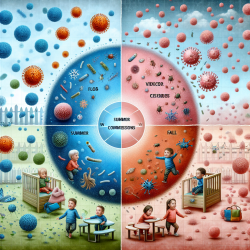Understanding the Impact of Hybrid Seeds on Modern Agriculture: Lessons for Speech-Language Pathologists
As a speech-language pathologist deeply invested in data-driven decision-making, you might wonder what hybrid seeds have to do with your practice. The research article "Breeding Confusion: Hybrid Seeds and Histories of Agriculture" by H. A. Curry offers a fascinating exploration of hybrid seeds' role in agriculture, which can provide valuable insights into enhancing your therapeutic strategies.
The Evolution of Hybrid Seeds
Hybrid seeds, particularly F1 hybrid corn, have been pivotal in shaping modern agriculture. These seeds were developed to increase yields and ensure consistent crop quality. The commercialization of hybrid seeds revolutionized the agricultural industry, leading to a significant shift in how seeds were produced and distributed. This transformation is akin to the shifts we see in therapeutic practices when new methodologies or technologies are introduced.
Data-Driven Decision Making in Agriculture and Therapy
The development of hybrid seeds was driven by data and experimentation, much like the evidence-based practices in speech-language pathology. The agricultural sector's reliance on data to improve crop yields parallels how therapists use data to refine and enhance therapeutic outcomes. By understanding the historical context and the impact of hybrid seeds, therapists can draw parallels to their practice, emphasizing the importance of data in driving effective interventions.
Lessons for Speech-Language Pathologists
- Embrace Innovation: Just as hybrid seeds represented a new frontier in agriculture, therapists should be open to integrating innovative practices and technologies into their therapy sessions.
- Focus on Outcomes: The success of hybrid seeds was measured by increased yields. Similarly, therapists should focus on measurable outcomes to assess the effectiveness of their interventions.
- Adaptability is Key: The agricultural industry had to adapt to new seed technologies. Therapists must also be adaptable, ready to incorporate new research findings into their practice.
Encouraging Further Research
The complexities surrounding hybrid seeds highlight the need for ongoing research and critical assessment. Speech-language pathologists can take a cue from this by continually engaging with the latest research to refine their practices. Encouraging a culture of inquiry and continuous learning can lead to improved outcomes for children.
To delve deeper into the fascinating history and implications of hybrid seeds, I encourage you to read the original research paper. Understanding the broader context of how innovations impact industries can provide valuable insights into your practice as a speech-language pathologist.
To read the original research paper, please follow this link: Breeding confusion: hybrid seeds and histories of agriculture.










